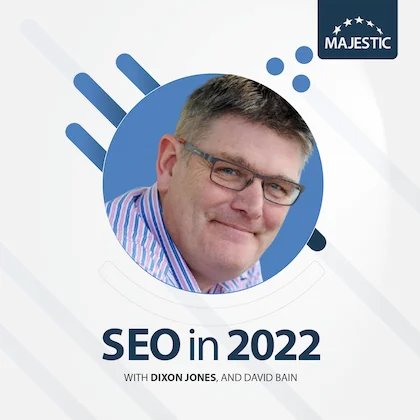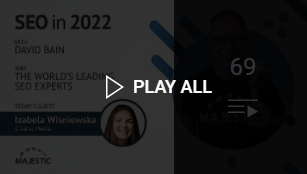-
Site Explorer
- Majestic
- Summary
- Ref Domains
- Backlinks
 New
New Lost
Lost- Context
- Anchor Text
- Pages
- Topics
- Link Graph
- Related Sites
- Advanced Tools
- Author ExplorerBeta
- Summary
- Similar Profiles
- Profile Backlinks
- Attributions
- Compare
-
Link Tools
- My Majestic
- Recent Activity
- Reports
- Campaigns
- Verified Domains
- OpenApps
- API Keys
- Keywords
- Keyword Generator
- Keyword Checker
- Search Explorer
- Link Tools
- Bulk Backlinks
- Neighbourhood Checker
- Submit URLs
- Experimental
- Index Merger
- Link Profile Fight
- Mutual Links
- Solo Links
- PDF Report
- Typo Domain
- Free SEO Tools
-
Support
- Blog

- Support
- Get started
- Tools
- Subscriptions & Billing
- FAQs
- Glossary
- How To Videos
- API Reference Guide

- Contact Us
- About Backlinks and SEO
- SEO in 2024
- Link Building Guides
- Webinars
- Blog
Do not ignore Passage Indexing
Dixon Jones
Dixon shares the importance of Passage Indexing - understanding which content from your web page is being featured on the SERP, by Google.

Do not ignore Passage Indexing
Dixon says: "In 2021, Google started talking about passage indexing as something they were going to be working on, but they've not been very specific about what this is going to be. Even though all the headline SEO places are saying passage indexing is coming, Google is simply not doing a good job of talking about it. Let me try and explain my understanding of this concept.
What makes up knowledge is interesting, because it's lots of different ideas or topics around a subject. For example, if you have an encyclopaedia on gardening, you've got lots of really interesting elements, and different articles that are all equally valid. When you try and put all that onto one page, you've got expertise all throughout, with different bits of information and ideas. Passage indexing is the understanding from Google that a good page of content is probably talking about many different ideas and topics, in the same corpus of content.
Trying to understand those bits separately probably makes more sense. Looking at things by passages and sections, rather than the text as a whole, is generally much better. A good example of this is if you wanted to find out what eBay was about: it is made up of so many different products and every single page is a different idea. If you can take that concept and bring it down to a page level, even each page is about all sorts of different things - so all of a sudden, it's about nothing.
Chunking
One sentence, or a block of text, may absolutely answer a user's question - so it's a way of looking at a needle in a haystack. What's really interesting is that Majestic came up with this idea of breaking a web page down into chunks, or sections, back in 2019. Earlier research suggests that analysing the content of a page in chunks is better than analysing the whole, to get the meaning of that page.
Measuring chunks and passage indexing sound like similar concepts to me, and passage indexing probably describes it better than chunking. Majestic divides a web page into 40 different sections and looks at the angle, and the links in context, within those sections. It's great that Majestic does this, and it is both interesting and useful. Understanding these sections of text might be much more valuable in the future, and it will probably change the way we write content."
Research from Google suggests that 7% of search queries will be affected by this - which is relatively significant. Are there any particular types of businesses that are more likely to take advantage of passage indexing?
"It may be very useful for products that have a high spec. For example, you might want a certain width screw - so you have a very detailed need for a product that is very specific. If a supplier has filled out their product specs for thousands of different screw types, then Google can pick that up and understand that this particular product will fit this particular user's needs.
Google are saying they're trying to fix a very unique user requirement that's unlikely to be needed again. The problem here is that you could spend all your time doing SEO for one person that may or may ever come along. You've got to get that balance right, between putting everything into a way that Google can understand at a passage level, and time.
I suspect data sets and how you display them will be important. I think the downside for us is that people who've written things in bullet points may have a disadvantage. Bullet points used to be a quick way of covering all the key ideas. However, they are unlikely to do well in Google's meritocracy-based system that wants to return the best content. Also, you would assume that long-form content is now broken up into more meaningful subsections as Google is trying to understand a little section of that web page. It might be that long-form starts to lose some of its influence on SERPs, although it's difficult to say how it will pan out."
Bullet points often appear in featured snippets, so what's the main difference between featured snippets and passage indexing?
"I think it's the stage at which Google is analysing the information. Featured snippets are really done at the reveal stage for Google. When you've typed something into a search engine, it's already indexed absolutely everything, and it knows what's where - what's an FAQ, what's an event, and who's a person. Google can then use featured snippets to better display its already organised, understood, and indexed content.
Passage indexing is at a much earlier stage - it's about how it's going to store that information in the first place. It's about how it reads your page, and where it puts it in Google's huge machine of databases and structured data. You could think of passage indexing as being passages of rich snippets. I expect Rich Snippets to start showing passages of text better than they did before. I suspect that a passage could easily be shown as a rich snippet, but the fact it's indexed in a different way means they'll have this magic sentence that hopefully is going to answer a very specific user's requirement.
I reckon this is going to be mainly driven by Voice Search. You're going to say, 'Google, where can I find a bolt with a flange of 2.3 centimetres and a length of 4 centimetres?' and it'll find a passage with that exact bolt somewhere and read it back to you. Bullet points will cover a lot of different ideas in a very short period of time, so they don't make a very good passage index. A good passage index is a well-formed couple of sentences that very much explain an answer to a super-specific query."
One scary situation for SEOs is the thought of appearing in a search result, but not getting a click through to a web page. Is passage indexing, and more content appearing in the SERP, likely to result in more people staying on the SERP and not visiting web pages?
"Yes. Your business has to cope with this being a positive, not a negative. If you're the person selling the 2.3 centimetre flange screw, then you're not going to have a problem. The problem arises if you're trying to monetise the information - this is a challenge. Google wants to be the world leader in monetising information itself. You are basically a competitor to Google. One solution is to put your stuff behind a walled garden and try and make people pay for that information, but Google wants to show it and charge somebody else to advertise for a 2.3 centimetre flange.
Moving forward, Google is certainly aware that we're starting to search in different ways. We're no longer looking at the homepage of Google for our search. We're starting to use voice and all manner of devices that don't have a keyboard or mouse. We have to make sure our businesses are able to cope with this."
If an SEO wants to start taking advantage of passage indexing, what are the steps they need to take to restructure, reorganise, and rewrite existing content?
"I would imagine that writing paragraphs rather than bullet points is probably helpful, but the paragraphs don't have to be hugely long. What may well help is page indexes -links within the page to the different sections. You could have all the things you're about to talk about with little hyperlinks at the top of the page. That would certainly help Google identify which sections are about specific ideas or concepts. You could use the bullet points at the top as a table of contents in this content-driven approach.
You can use schema in paragraphs and text as well. 'How To' schema is quite complicated because it requires an image for each section to be properly formed. However, having each section in your How To process properly marked-up with an image is going to help. Google is going to be able to see where the individual steps are in a long process of learning. This will really help Google to dive in and not just give the answers to generic questions."
If an SEO is struggling for time, what's one thing they should stop doing, so they can spend more time focusing on passage indexing?
"I would stop trying to write the same thing on your website in 20 different ways. Instead, cover more topics in smaller amounts. You can still do it in long-form content, but these paragraphs have got to make sense on their own. Make sure your paragraphs stand up on their own two feet. If that paragraph was the only thing on your website, or that came back in the search result, would it make sense? Does it answer a particular question, have a call to action, and monetise that information?
We've become lazy as human beings, writing content and understanding the importance of a paragraph, but machines are going to understand the paragraph. You need to consider a paragraph and a passage as the same thing - and make sure they are self-contained."
You can find Dixon Jones over at DixonJones.com.
Choose Your Own Learning Style
 Video
Video
If you like to get up-close with your favourite SEO experts, these one-to-one interviews might just be for you.
Watch all of our episodes, FREE, on our dedicated SEO in 2022 playlist.
 Podcast
Podcast
Maybe you are more of a listener than a watcher, or prefer to learn while you commute.
SEO in 2022 is available now via all the usual podcast platforms
Don't miss out
Opt-in to receive email updates.
It's the fastest way to find out more about SEO in 2025.
Could we improve this page for you? Please tell us





